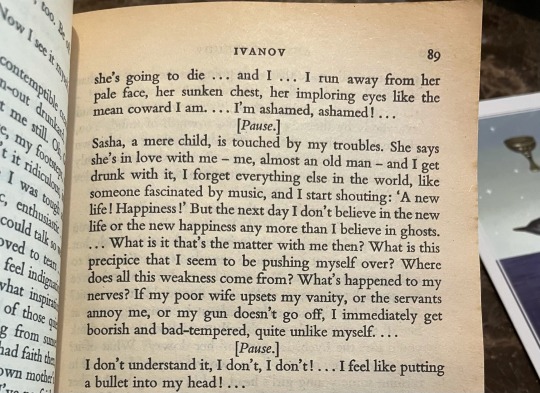#ivanov by anton chekhov
Text

Digital painting of Stefán Karl as Count Matthew Shabelskii from Ivanov by Anton Chekhov

#stefán karl stefánsson#stefan karl#stefan karl stefansson#stefán karl#robbie rotten#not lazytown#ivanov by anton chekhov
13 notes
·
View notes
Text
"Let things that happen onstage be just as complex and yet as simple as they are in life. For instance, people are having a meal, just having a meal, but at the same time, their happiness is being created, or their lives are being smashed up."
- Anton Pavlovich Chekhov
With that in mind, let's talk about the Shrek 2 dinner sequence.
No, seriously. While perhaps not as intricate and dramatic as Chekhov's Ivanov, which tells the story of a man's decline into depression through heartbreaking subtext in the dialogue between himself and his peers as he gradually alienates himself from them, the dinner sequence in Shrek 2, I believe, is a three-minute masterclass in a similar sort of storytelling to the one that characterizes many of Chekhov's dramatic works. Chekhov was a big advocate of the "show, not tell" principle, and the Shrek 2 sequence demonstrates a fabulous exercise in this sort of writing, assisted by genius camera angles. I unironically love this sequence and how much it can tell us about writing- it demonstrates a complex show of dramatic tension and subtext, pacing, character dynamics, and cinematography, while also progressing the wider story and balancing the drama with the Shrek franchise's style of humor- which is not an easy feat to pull off. I really want to talk about this sequence and dissect it, because it's honestly taught me a lot as a writer.
So for context, in case you haven't seen Shrek 2, Shrek, an ogre, and his wife Fiona are having dinner with Fiona's parents, the king and queen. Due to a magic spell, Fiona has been permanently transformed into an ogre after falling in love with Shrek- which she gladly accepts, but her parents do not. With them is Donkey, a comic relief character. Due to the curse, Fiona's parents locked her in a tower until her "true love" could rescue her- which, of course, turned out to be Shrek in the previous movie. We see in this sequence that Fiona's parents have different attitudes towards the couple; later on in the movie, it's revealed that her father was the Frog Prince, contributing to her parents' opinions on magic spells impacted by "true love's kiss."
So, onto the scene.
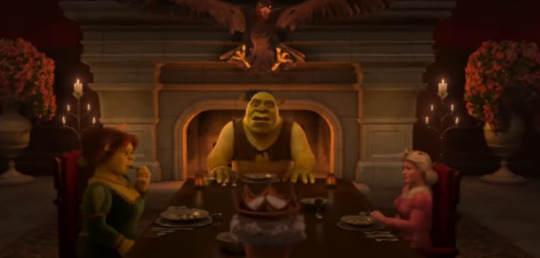
First, we get an establishing shot of Shrek at the table, which is zoomed out to show Fiona and her mother sitting on either side, and Fiona's father on the opposite end. Obviously, two characters on either side of a long table is an easy way to show they are opposed to each other. Although the characters haven't spoken yet, an uncomfortable mood is quickly established- Shrek's facial expression looks uneasy. Behind him is a stuffed hawk and a fireplace- perhaps a nod to the fact that ogres are seen as predators to be hunted with torches and pitchforks. On either side of Shrek are two candelabras; he is surrounded on three sides by fire and the lighting is primarily cast upon him. The hawk's talons are also pointed down directly at him, and the scene is lit in an ominous red light.
The next few shots establish all the conflicting moods that will be at odds during the scene. Queen Lilian is, if you will, attempting to be an "ogre ally." She attempts to be accepting towards Shrek and Fiona's decision, but is still clearly uncomfortable. King Harold, however, makes no attempt to hide his contempt. It's him and Shrek- again, seated at the opposite ends of the table- who will have the most direct conflict. (Perhaps this is a small detail, but Lilian and Harold are dressed in pink and blue, respectively- feminine- and masculine-coded colors that contrast with each other. This may reflect their adherence to conservative societal norms, specifically relating to gender roles and relationships.)
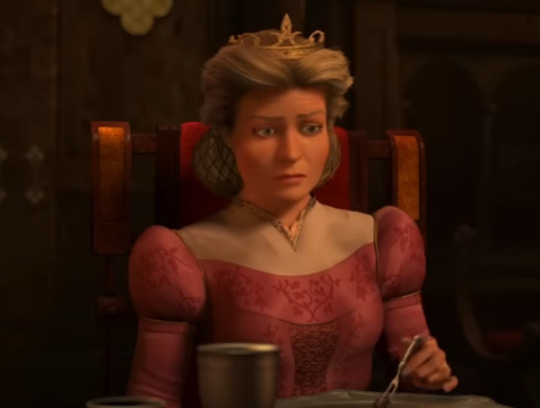
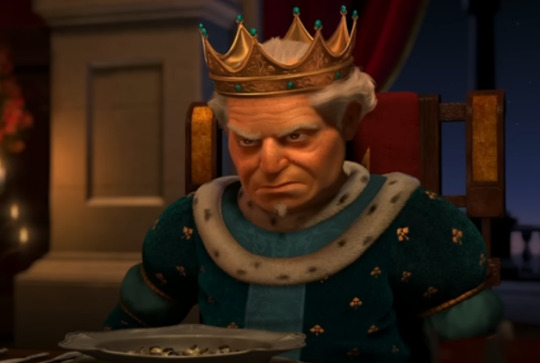
No dialogue has been spoken yet, and the conflict is still being established. We get a POV shot of Shrek's plate, consisting of escargot and multiple different kinds of utensils, after Shrek nervously picks at it. The composition of the plate and utensils is complex, elegant, and orderly, again highlighting that Shrek is out of place.

The silence is first interrupted as Shrek picks up a snail with his fingers and bites into it with a loud crunch. The first domino has fallen; Shrek foregoes the utensils to eat in a manner familiar to him, creating a marked contrast with the way we assume Fiona's family will eat. Afterwards, we have a shot of Harold looking even angrier; Shrek has broken a social norm. Shrek smiles with his mouth full; we get Lilian looking even more nervous as she eats her escargot with a fork, and Fiona drinks from a glass of water.
Fiona, who is unwillingly assigned the role of mediator between the two parties, belches after drinking the water- a behavior expected from Shrek. She excuses herself politely, which is understood as an attempt at keeping the peace. However, Shrek cracks a crude joke ("better out than in, I always say!"), and they both laugh as the second domino falls. Lilian and Harold look uncomfortable; Fiona laughing at Shrek's joke and displaying chemistry with him communicates that she is on Shrek's side, not theirs. Noticing their discomfort, Shrek and Fiona stop laughing and appear dejected.
The tension is built further as Donkey enters. Donkey plays up the comic relief the entire time, but also adds to the tension more than he diffuses it. While friendly, he's loud and messy, and while Lilian looks at him curiously, Harold treats him rudely, shouting "bad donkey; down!" Fiona again attempts to ease the tension, explaining that Donkey helped rescue her. Donkey proudly agrees, but then demands a bowl for himself from the waiter. Shrek facepalms and says "oh boy;" there is now another conflicting dynamic in the room. Donkey, who has no interest in conforming to social norms, heightens the tension as Shrek and Fiona attempt to appease Fiona's parents.
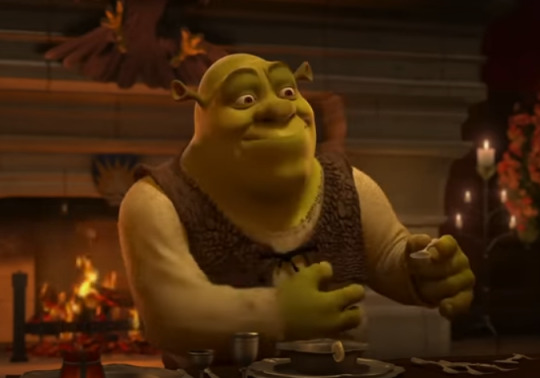
Another domino falls. Shrek drinks from the bowl of water given to him, which is supposed to be used to wash his hands. Fiona gets his attention, and dips her hands in the bowl to signify its purpose without making it obvious to her parents that Shrek doesn't know what the bowl is for. Shrek doesn't pick up on the hint, and attempting to be polite, compliments the Queen on the "soup," even using the spoon- once again, trying to conform to the cultural norms of Fiona's parents. However, this time, he's supposed to use his hands and not utensils, as opposed to the escargot, where he was supposed to use utensils and not his hands. The only lines exchanged in these few seconds are:
Fiona: "um, Shrek?"
Shrek: "Ohh, sorry. Great soup, Mrs. Q."
Fiona: "No no no, darling."
However, through the action and the subtext given from the background of the film, the audience knows the tension is heating up. While only a few lines of dialogue are exchanged, we know from the few seconds of the "soup" sequence that Shrek is having more difficulty conforming, Fiona is having more difficulty keeping the peace, and her parents are having more difficulty masking their discomfort. Donkey seems completely oblivious to the conflict, paradoxically heightening it through contrast.
Queen Lilian starts the first actual conversation of the scene, a minute and 22 seconds in. She asks Shrek and Fiona where they live. As the audience, we know that they live in a swamp, but Shrek and Fiona don't want to say that because they want to appease Fiona's parents. Fiona answers, "Shrek owns his own land." This carefully-calculated answer isn't a lie, but it's not the whole truth, either. "Land" could mean anything, and the idea that Shrek owns land is an attempt to present the idea that Shrek is assimilated into the dominant culture. As ogres are presented as second-class (or should we say Shrekond-class) citizens in the Shrek universe, the idea that Shrek owns land may communicate that he is wealthy and conventionally successful, and is able to climb the social ladder and provide Fiona with the life her parents wanted for her.
Shrek, still nervous but playing along with what Fiona has laid out for him, confirms that they live in an "enchanted forest, abundant with squirrels and cute little duckies." Again, this is an attempt to console FIona's parents. But Donkey, unaware of what's going on, interrupts with, "what? I know you ain't talking about the swamp!"
Another domino falls as Shrek attempts to silence Donkey, but Harold latches onto this line, instead of keeping up the crumbling façade that everyone else (sans Donkey) is trying to uphold. Sarcastically, he responds with "an ogre from a swamp? How original," as Donkey laps from his water bowl. Now that Fiona's parents have acknowledged Shrek and Fiona as "living in a swamp," it becomes even harder to diffuse tension, as this is something they find undesirable. Because Donkey has confirmed it, Shrek and Fiona also can't fall back on the "enchanted forest" excuse they used earlier; it also affirms the stereotype for Harold that ogres live in swamps. Through his “how original” line, Harold is commenting that Shrek is not assimilated and fits the mold of a stereotypical ogre- perhaps suggesting he believes him to fit other ogre stereotypes, such as being monstrous, crude, or aggressive.
Despite the fact that Harold is now fully committed to heightening the tension, Lilian still attempts to resolve it- deepening their own rift of conflict. She comments that it will be a "fine place to raise the children," trying to reconstruct the idea that Shrek and Fiona can still live the nuclear family life that she wants for her daughter. However, this is immediately shattered, as Shrek and Harold- shown again from opposite ends of the table- choke on their food in shock- Shrek because he and Fiona are not interested in having children at the moment, and Harold because he doesn't want his daughter having children with Shrek.

To recap, before the dinner, Shrek and Fiona shattered two of the King and Queen's expectations:
1. Fiona has married Shrek, an ogre.
2. Fiona is now an ogre herself.
However, at the dinner- a minute and 53 seconds in- they have shattered three more of their desires for Fiona's married life:
Shrek, Fiona's husband, cannot perform conformity through manners and etiquette.
Shrek and Fiona live in a swamp, and not somewhere expected for a prince and princess.
Shrek and Fiona are not currently interested in having children and raising a traditional nuclear family- and if they did have children, they would be ogres.
From here, the tension still keeps rising, and the scene is only a little over halfway through. We get another POV shot from Shrek's perspective, as he coughs up the spoon- the symbol of performing that etiquette- and it bounces across the table towards Harold. Fiona, Lilian, and Donkey all look at Shrek in surprise; Harold looks at him in disgust.
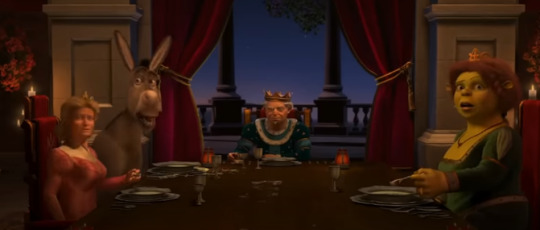
Shrek continues to express his discomfort while being polite, saying it's a bit early to be thinking about children. Harold makes no attempt to hide his prejudice, saying "indeed; I just started eating," blatantly implying that the idea of Shrek and Fiona having children revolts him. Lilian responds with an irritated "Harold!" and Fiona says "Dad, it's okay," but Shrek has refused to let go of the argument, feeling insulted. He responds with "what's that supposed to mean?", trying to force Harold to voice his prejudices expressly.
The argument is now in full swing. Harold responds to Fiona (while gesturing at Shrek with the spoon) with "for his type, yes;" Shrek answers angrily with "my type?" Harold hasn't yet explicitly voiced that he doesn't like Shrek because he's an ogre, but at this point, it's completely obvious. Donkey finally picks up on the tension and excuses himself to go to the bathroom, but returns quickly to the table as the main course is brought in. Harold and Shrek glare at each other from across the table as the background music picks up into a waltz and the camera shows the waiters walking around the table with an elaborate meal- the setting of an upscale royal dinner is more forcibly established, but Harold and Shrek are no longer interested in playing up appearances.
Lilian and Donkey see an opportunity to make one final attempt to diffuse tension with the arrival of the meal- Donkey jokes, "Mexican food, my favorite!" (despite the meal resembling a Medieval European-style feast) and Lilian encourages everyone to eat, which Donkey enthusiastically agrees to. However, Harold and Shrek refuse to let the argument go.
Harold violently grabs a lobster from the table, saying, "I expect any grandchildren from you would be..." and Shrek grabs his own plate, angrily responding, "ogres, yes." Shrek is the one to drop the word "ogre,” which everyone has mostly been avoiding this whole time (aside from Harold’s “ogre from a swamp” line). In this, he displays he's unashamed of the fact he and Fiona are ogres, a pointed insult towards Harold, who is clearly prejudiced against them but refuses to say so explicitly.
Lilian cuts in with a "not that there's anything wrong with that," and then a pointed, "right, Harold?" She's still trying to downplay the conversation and keep the peace, while wanting to communicate to Shrek and Fiona (especially Fiona) that she's not prejudiced against them, (even if she is, albeit to a lesser extent than Harold). Harold then makes an explicitly prejudiced statement relying on stereotypes of ogres- "No, no- that is, if you don't eat your own young!" while slicing through the lobster with his knife.
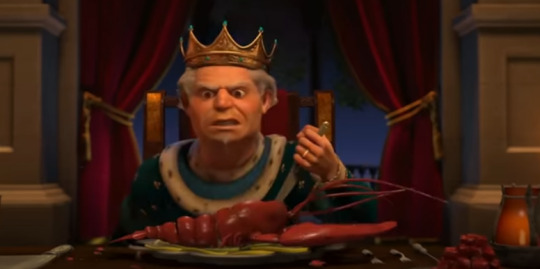
Fiona responds with a shocked, "Dad!" before Shrek fires his own retort- "we usually prefer the ones who have been locked away in a tower!" and tears apart the roast turkey on his side of the table, biting into it forcefully- a show of rejection against the etiquette he has been expected to display. As we know from previous context, this line is a thinly-veiled insult at Harold and Lilian, who had locked Fiona in a tower throughout her childhood and adolescence. Furthermore, Shrek is here communicating that Harold is a hypocrite- he criticizes Shrek's ability to be a parent, but also neglected his own daughter.
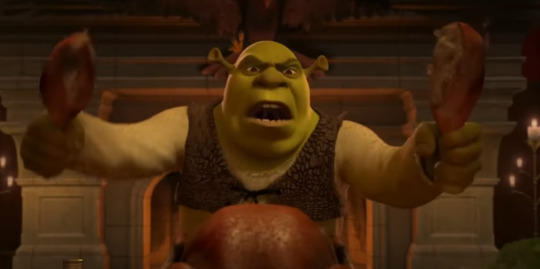
Fiona gives an angry "Shrek, please!", but Harold immediately picks up on the barb, responding with "I only did that because I loved her!" From there, the argument fully escalates, turning physical as a food fight breaks out. As both Shrek and Harold fully disregard manners and social etiquette, poor Lilian sadly remarks, "it's so nice to have the family together for dinner" with a distraught look on her face as food flies past her. The argument culminates in Shrek and Harold fighting over a roast pig and the characters all shouting each other's names in a last-ditch attempt to stop the fighting (and Donkey shouting his own for comic relief). As we get a final shot of the destroyed dinner scene, Fiona- who has attempted to mediate the argument this whole time- runs out without a word, as both Harold and Shrek give each other angry glances.
From here, the rest of the film unpacks and resolves the arguments built up in this short three-minute scene. What started as a quiet dinner quickly, but gradually, evolved into a full-blown argument about bigotry, societal norms, and family expectations- all themes that carry the character arcs of Shrek, Fiona, Lilian, and Harold. The genius about this scene is that the tensions were always there from the beginning; the majority of the conflict started before the actual physical fight- happening, as Chekhov said, as "complex and simple as in real life."
#writing#film analysis#shrek#shrek 2#chekhov#man those are weird tags to have together#long post#shrekhov???
31 notes
·
View notes
Note
Hey Frankie who are your top 10 husbands?
Thanks for asking -- this is pretty easy
1. Vlad the "honey" of Nabokov
2. Humbert Humbert, The "Horny" Humbert of Nabokov. I am not kidding about the quotes, read him.
3. Mr. Mottram of Pynchon's The Crying of Lot 49, the "weird" Mr. Mottram.
4. Raffles of E.M. Forster's story collection.
5. Vronsky of Tolstoy's Anna Karenina, the "romance" Vronsky.
(6.) The young doctor of Turgenev's Fathers and Sons
7. Gribouille of Gogol's Dead House (or, as I like to say, "a horror story")
8. Ivanov of Anton Chekhov's Ivanov. (Incidentally, Chekhov is "incorrect" about Ivanov, because Ivanov, an introvert, is actually the least interesting one in the novel in any way that matters, and the two other brothers are more interesting but not in any way that matters.)
9. John Gray of Thomas Pynchon's Vineland. He's "the most interesting man in the novel," although he doesn't act like it.
10. Zhenya of Dostoevsky's The Brothers Karamazov, the "unfaithful husband."
11 notes
·
View notes
Link
0 notes
Text

“A naive man is nothing better than a fool. But you women contrive to be naive in such a way that in you it seems sweet, and gentle, and proper, and not as silly as it really is.”
–Anton Chekhov, Ivanov (1887)
Photo by Ferdinando Scianna
0 notes
Text



((Derek rehearsing Ivanov staged by Toby Robertson with Louise Purnell at the Old Vic Theatre. Previewed 16 August 1978, Opened 18 August 1978, Closed 8 December 1978 (in repertory) at the Old Vic Theatre. Presented by the Prospect Theatre Company in a translation by Ariadne Nicolaeff (Play and The Players)
11 notes
·
View notes
Quote
Chekhov once wrote that 'Nina's part is everything in the play.' The first of Chekhov's heroes of what I call existential sobriety, a person who neither begs for the impossible nor abjectly surrenders to what seems to be inevitable, but courageously lives through whatever life demands of her, at the same time as it grants her - if she'll seize them - the virtues she needs to survive, to go on: clear understanding, courage, humility, stamina. Sonya in Uncle Vanya, all three Prozorov sisters, and Anya, Varya, and Mme Ranevskaya in The Cherry Orchard will follow in Nina's footsteps.
Against her balanced and hard-earned self-knowledge, her integrity, Chekhov puts Treplyov's immaturity, romanticism and moral weakness. The climactic scene, Nina's unavailing visit to Treplyov, takes its place among the great moments of Chekhovian theatre, and is a workshop in his techniques. I have space for one central example: after Nina says, 'You're a writer, I'm an actress,' she adds, 'I loved you, I dreamed of being famous, but now?' She breaks off and tells him some details of her physical life since she left him, which we know has been bitterly painful. Treplyov's fateful response is to ignore her words and burst out with 'life has been unbearable for me' and 'I call you, I kiss the ground on which you've walked...' To this Nina ('bewildered') asks, 'Why is he talking like this?' and repeats the words, which, we quickly see by her use of the impersonal 'he', are not a question but a complex recognition: that Treplyov doesn't so much love as desperately need her, that his emotional immaturity extends to his would-be artist's self; his writing is lifeless because in some deep dimension he himself lacks animation, life. Before leaving, Nina tells Treplyov what she has learned about being an artist: 'I know now, I understand...the most important thing isn't fame or glory or anything I used to dream about - but the ability to endure. To know how to bear your cross and have faith...when I think about my vocation, I'm not afraid of life.'
Treplyov, who lacks a true vocation, *is* afraid, and his shooting himself is an extreme demonstration of his inability to persevere. A measure of Chekhov's artistic growth is the difference between the suicides with which both Ivanov and The Seagull end. Nikolay's shooting himself is inorganic and arbitrary, issuing from the stock of melodramatic actions and situations with which Chekhov was familiar. Treplyov's suicide comes from the heart of the play's vision, which itself is seized from actuality in order to be dramatized.
Perhaps the shrewdest comment on the play and its ending was made by someone outside the theatre and academic life. After praising the work, the well-known jurist Anatoly Koni wrote to Chekhov: 'How good the ending is. It is not she, the seagull [who] commits suicide (which a run-of-the-mill playwright, out for his audience's tears, would be sure to have done) but the young man who lives in an abstract future and has no idea of...what goes on around him.'
Richard Gilman, from his introduction to the Penguin Classics collection of Anton Chekhov’s Plays (Ivanov/The Seagull/Uncle Vanya/Three Sisters/The Cherry Orchard)
38 notes
·
View notes
Text

I'm obsessed with the foreword of this collection of Chekhov's major plays by Robert Brustein. The book has the scent of tall trees where an old church might meet an inner city park. Time to read.
(Chekhov: The Major Plays | Ivanov • The Sea Gull • Uncle Vanya • The Three Sisters • The Cherry Orchard)
#reading#long reads#book collection#anton chekhov#chekhov#chekhov's plays#ivanov#the sea gull#uncle vanya#the three sisters#the cherry orchard#russian theater#literary analysis#foreword#books im reading#my book collection#dark acadamia aesthetic#dark academia#light academia#light acadamia aesthetic#studyblr#writerblr#readerblr
16 notes
·
View notes
Text





Tom Hiddleston as the young doctor Eugene Lvov, in an adaptation of Anton Chekhov's Ivanov penned by Tom Stoppard, directed by Michael Grandage at the Wyndham's Theatre on the West End, in London - September, 2008.



Tom in rehearsal of the play-

#tom hiddleston#hiddles#twhiddleston#Ivanov#Eugene Lvov#Anton Chekhov#Tom Stoppard#Michael Grandage#Wyndhams Theatre#Kenneth Branagh#West end theater#September#hiddles 2008#tom hiddleston stage performance#blonde curly hiddles#tom in rehearsal#black and white photography#throwback#London#eleven years ago
259 notes
·
View notes
Quote
But the next day I don’t believe in the new life or the new happiness any more than I believe in ghosts. What is it that’s the matter with me then? What is this precipice that I seem to be pushing myself over? Where does all this weakness come from?
Ivanov, Anton Chekhov, 1887
21 notes
·
View notes
Quote
Never tell a woman how good you are; let her find it out herself.
Anton Chekhov (1860-1904), from “Ivanoff″ (1887), translated from the Russian by Constance Garnett
“Никогда с женщинами не говорите о своих добродетелях. Пусть они сами поймут.”
#Anton Chekhov#Ivanoff#Ivanov#Russian literature#Russian writer#literature#quotes#русская литература#русский писатель#литература#цитаты#Чехов#Иванов
166 notes
·
View notes
Quote
The flowers come up again every spring, but joy there is none.
Anton Chekhov (tr. Peter Carson), Ivanov
#anna petrovna#anton chekhov#ivanov#chekhov#lit#spring#russian literature#play#extracts#play quotes#peter carson
17 notes
·
View notes
Text
And now, you know, I’m beginning to feel surprised at the unfairness of people: why don’t they respond to love with love, why must they pay back truth with falsehood?
A. P. Chekhov, Ivanov
17 notes
·
View notes
Quote
my soul trembles with fear of tomorrow…
Anton Chekhov, Ivanov
4 notes
·
View notes
Text
e-book grátis: ANTON CHEKHOV: CRIAÇÃO A PARTIR DO VAZIO, Lev Shestov
_______________Para ler: https://bit.ly/3rPLa3i
ANTON CHEKHOV: CRIAÇÃO A PARTIR DO VAZIO é um estudo biográfico e crítico da obra de Anton Chekhov. Introdução à obra de Anton Chekhov. Análise dos contos de Anton Chekhov. O Caderno de notas de Anton Chekhov.
Chekhov tinha inicialmente escrito contos para ganhar dinheiro, mas à medida que sua ambição artística crescia, ele fez inovações formais que influenciaram a evolução do conto moderno.
"Quando uma pessoa nasce, ela pode embarcar em apenas um dos três caminhos da vida: se você der certo, os lobos o comerão; se você for para a esquerda, você comerá os lobos; se você for direto, você se comerá. A ausência do pai ou Platonov, Ato I, sc. xiv (1878)". Tradução e organização: Giacomo Pupred. Edição ilustrada.
#antonchekhov#chekhov#teatro#bookstagram#iteratura#citações#echov#gaivota#literatura russa#gatos#arte#thecherryorchard#livros#rússia#ivanov#unclevanya#artista#anton#tchekhov#eggereirussa#gatos do instagram#filosofia#clássico#ezionidiletteratura#escritorrusso#atriz#eggere#booknerd
0 notes
